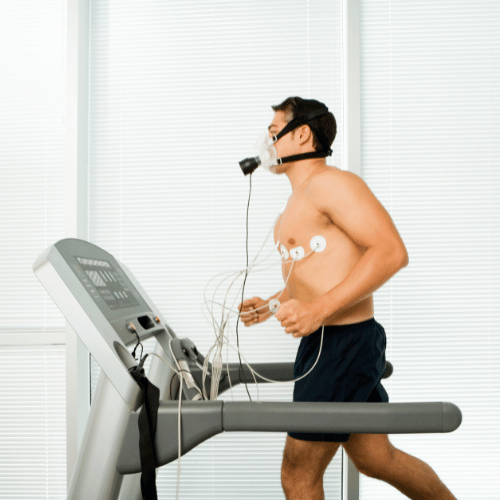
Medical Weight Loss Explained
A lot is said about medical weight loss but we are here to debunk the myths for you.
Cardiology > Treadmill Testing

Find Out More


A treadmill test measures the way that your heart responds to exercise, and gives a good general picture of your heart’s health. The test begins with a cardiologist recording your ECG and blood pressure when you are resting.
You will then walk or run on a treadmill for up to 15 minutes, during which activity your ECG and blood pressure will be tested again. Ideally you will move on the treadmill until a target heart rate has been reached, or until your symptoms have been triggered.

Treadmill testing is crucial for several reasons. Firstly, it aids in diagnosing heart conditions by helping identify coronary artery disease, arrhythmias, and other cardiac issues that may not be apparent while at rest.
The test is also valuable for evaluating exercise capacity, providing information on your cardiovascular fitness and endurance. It also plays a role in assessing recovery, as it allows us to monitor how quickly your heart rate returns to normal after exercise, which can indicate overall heart health.
Furthermore, the results from treadmill testing can guide treatment plans, enabling us to tailor your treatment or rehabilitation plan to better manage or prevent heart-related conditions.


Treadmill testing is suitable for a wide range of individuals. For patients experiencing unexplained chest pain or discomfort, this test can be particularly beneficial in diagnosing potential heart issues.
Individuals with risk factors such as high blood pressure, high cholesterol, diabetes, or a family history of heart disease can use the treadmill test to assess their cardiovascular health. Athletes and active individuals may undergo this test to evaluate how their heart functions under exertion and to ensure it is adapting well to their physical activity levels.
It is also used for people requiring pre-surgery evaluation to assess cardiovascular risk before undergoing major surgery or other medical procedures.
Signs of exertion that may call for a treadmill test include:
Use our online booking engine or book your test by giving us a call.
On the online booking engine select the “appointment type” you need.
You will be seen by one of our friendly doctors or trained clinicians.

Avoid heavy meals 2 – 3 hours before the test. Opt for a light meal or snack if necessary. Drink plenty of water but avoid excessive intake immediately before the test. Inform your healthcare provider about any medications you are taking. Follow their instructions on whether to take them before the test. Wear comfortable, breathable athletic wear and sturdy, non-slip shoes. Refrain from consuming caffeine or smoking at least 24 hours before the test. Be prepared to discuss your medical history, including any heart conditions, symptoms, or recent illnesses.

Electrodes will be placed on your chest to monitor your heart’s activity. A blood pressure cuff may be used as well. You will walk or run on a treadmill with increasing intensity. The test aims to assess how your heart responds to physical exertion. Inform the technician immediately if you experience any discomfort, pain, dizziness, or shortness of breath. The test typically lasts 10 – 15 minutes, including the warm-up and cool-down periods.

After the test, you will be monitored for a short period while your heart rate and blood pressure return to baseline levels. Your results will be compiled into a report, which will be sent to your referring physician for interpretation.
Incorporated
in 1998
Experienced doctors & a professional team
Registration
not needed
Up-to-date with the latest treatments & testing
Strictly
confidential
Experienced doctors & a professional team
Affordable private
health care
Transparent fee structure with no hidden charges
We work with experienced consultants & healthcare professionals who have received positive feedback from our patients, and with whom we have established long-term relationships.
Latest Episode
Tune in to our podcast to explore the world of healthcare and learn from distinguished special guests. We cover everything from preventative measures to cutting-edge treatments so that you can stay informed and up-to-date on health-related things.

A lot is said about medical weight loss but we are here to debunk the myths for you.

Tourist in London and need a GP? Get fast, private care for illnesses, injuries, or lost medication. No registration needed.

With NHS appointments harder to access, many people are turning to private GPs for faster, more convenient care.
Subscribe for latest updates & news


From same-day private GP and blood test appointments to visa medicals, a sexual and reproductive health clinic, and preventative health screenings, we are here to help.
Contact Us
Accepted Insurance Companies






Please note that Walk-in Clinic is a private medical centre & not an NHS service. Harley Walk-in Clinic Ltd company registration no. 07472804